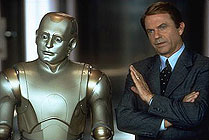|
|
|
|
Bicentennial
Man
|
 |
|
The symbiotic relation between human and android has become a familiar, even hackneyed theme in contemporary film and television. The Star Trek saga has spent pleasant years tracing the journey of Data, gradually exploring and discovering his human potential. David Cronenberg's films have consistently offered a darker, gothic version of the messy interpenetration of people and their futuristic, technological appliances. Andrew (Robin Williams) in Bicentennial Man is a cute android who is intrigued by his human masters' capacities for feeling, irrationality and humour. Beyond the obligatory allusion to the Tin Man from The Wizard of Oz (1939), however, there is more to this story than the yearning of a machine who "wants to have a heart", as well as a partner. As in the Isaac Asimov story from which it is derived, the relation between human and android in our future world is bound to be more complicated and reciprocal: as robots get inevitably, progressively "upgraded" to incorporate human bits, people benefit extensively from radical, prosthetic surgery. Who is to say, anymore, where humanity ends and technology begins? One can too easily dismiss Bicentennial Man as a saccharine, sentimental contrivance. And the signs of a finely calculated, audience-flattering entertainment are certainly evident: James Horner's tear-jerking score, painless death-bed scenes, stereotypical baddies. Thanks to the combined talents of director Chris Columbus (A Night on the Town [aka Adventures in Babysitting, 1987]) and screenwriter Nicholas Kazan (Reversal of Fortune [1990]), however, the film transcends its conventions and finds itself in altogether more intriguing terrain. Because the art of cinema begins with a bedrock of life-like appearances, story forms such as the fable or the fairy tale are hard to adapt to the screen. Many classic SF tales are philosophical fables: they skip through vast stretches of time and between far-flung worlds that carry little sense of detailed, weighty reality. Bicentennial Man is one of the few successful attempts to convey a SF fable on film. The progression of a future civilisation is sketched in fleeting, often deliberately understated details. Within this history, robotics is initially in vogue in middle class homes, but quickly becomes an obsolete technology. Narrative time is treated even more daringly. The film whizzes past the successive generations of a family, shedding inessential characters with ruthless efficiency. In order to construct a central continuity of emotion, Columbus pays disarming homage to the intensely romantic and rather unfashionable melodramas of Frank Borzage (I've Always Loved You [1946]): Andrew's first love, Miss, is "reborn" in the form of her daughter, Portia, and both are played by the same actress, Embeth Davidtz. Columbus treats a number of sensational topics – including sex with an android, and euthanasia – with matter-of-fact candour. Without too much fanfare, the film ultimately reveals itself to be more interested in issues of ageing and mortality than any speculation on robotics. The final scenes are especially affecting. Williams, mercifully, gives a restrained performance; it is his best work in many years. Columbus, of course, leans on the star's Mork-era pantomime skills for abundant comic effect. But, more cannily, he uses Williams' central limitation as an actor – his narcissism – as the trigger for a well-judged pathos. For once, Williams is perfectly cast, and his star persona does not overwhelm the role. Nor, for a change, does he overwhelm his co-stars: Davidtz, Sam Neill and Oliver Platt are all impressive. I warmly recommend Bicentennial Man. Many viewers will need to claw beyond their initial resistances to various levels of Hollywood-style mush, rhetoric and artifice. But the effort is worth it, because this is a surprisingly moving and brave-hearted film. MORE Columbus: Harry Potter and the Chamber of Secrets, Mrs Doubtfire, Nine Months, Only the Lonely, Stepmom © Adrian Martin December 1999 |
![]()